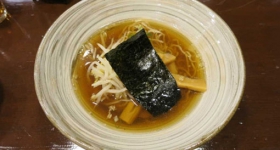Our Daily Bread – a multidisciplinary
dance production that brings narrative life to the intersection of food
justice, heritage, eating, and environmental sustainability – makes its way
back to Counterpulse (San Francisco) November 15-18, 2012. It is a timely
re-appearance. As we move closer to the American food festival we call
Thanksgiving and as Californians ponder the results of Proposition 37 (which
rejected the labeling of genetically modified foods), we see food being consumed
not only during our lunch breaks, but also in our national imagination.
I
first saw Our Daily Bread during its premiere run in April 2011 and was
impressed by the show’s depth, as well as its precise, athletic choices in
writing and choreography. Artist and activist Amara Tabor-Smith, director Ellen
Sebastian Chang, and visual artist Laura Diamondstone push this year’s Daily Bread down a more complex path than its first
staging, tackling the question of how we can see the food movement as a women’s
movement. In Amara’s own words, “In the first incarnation of this work, I did
not delve into this territory as deeply because it felt both intense and
controversial, but the more work I do around food, the more I realize I cannot
do this work and NOT address this.”
Towards
this end, Our Daily Bread seeks to
build more cross-cultural alliances and networks of support among women and
particularly, women of color. On Sunday, November 19, Our Daily Bread will add an offstage panel discussion, called Sisters at the Table. This free panel brings
together women who are experts in their fields, with the hope of fostering open
dialogue about their works’ intersections precisely by sharing how food issues
manifest within their own communities.
Panelist Mary Gee
(Vice-President of DYJ & Associates, Inc. and doctoral candidate in
Sociology at UC San Francisco) reflected to me by email, “As dialogue around
food awareness/justice issues become more prevalent in mainstream discussions,
I look forward to seeing more conversations bridging, not just highlighting,
food awareness and eating disorders, particularly within communities of color.” Mary will be discussing women of color and
eating disorders, and has been working for over a decade on the sociological
aspect of eating disorders within the Asian American community. Other speakers
include Rucha Chitnis (India Program
Director at Women’s Earth Alliance) whose expertise includes women farmers in
India, Ashara
Ekundayo (food justice activist and the panel moderator), Gail Meyers
(Executive Director of Farms to Grow, based in Oakland), and Tiny a.k.a. Lisa Gray-Garcia
(an author and homeless advocate).
Again,
Our Daily Bread is timely work, and its return
to Counterpulse shows great promise, both in terms of theatrical experience and
issues-based conversation. If you’ve been thinking about Thanksgiving though a
cross-cultural lens, this is your show. If you’re just hungry on some level,
this could be your show. To quote
Amara, “In an era when we are facing global food shortages and a rise in food-related
diseases, we see that this work as an opportunity to ‘feed’ people on multiple
levels.”
That is all. Buy tickets
here. Don’t forget the panel, and enjoy.
Getting Seconds: 'Our Daily Bread' Returns to Counterpulse this November
Categories:
Contributor:









Comments